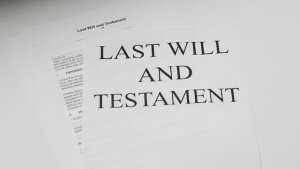Wills Disputes: The Duty To Account Is Not Absolute

Contact
Table of Contents
Beneficiaries frequently ask us whether trustees or personal representatives can be required to provide a financial account. Their request may already have been refused. They may be concerned that the estate and/or the trust is being mishandled or clarification regarding specific assets is desired.
The trust and probate disputes team at Osbornes Law are experienced in advising trustees, executors and beneficiaries where an estate or trust dispute arises, as well as beneficiaries seeking important information to which they are entitled. We also regularly advise clients where trust assets or family members are overseas.
Terminology
A Personal Representative (PR) is the umbrella term for ‘executors’ and ‘administrators’. If a deceased person died with a valid Will and the person(s) named in the Will are willing to act in the estate administration, this person is the executor. If a deceased person dies without a valid Will, an administrator will deal with his or her estate. Executives and administrators perform the same functions and owe the same duties, the key difference being that an executor derives authority from the Will itself. In contrast, an administrator’s authority is limited until such time as a Grant of Letters of Administration has been obtained.
What is the ‘duty to account’?
A PR, when required to do so, must render an account of the administration of the estate under section 25 of the Administration of Estates Act 1925. In practice, this means that the PR must keep estate accounts, and these should be made available for inspection by a beneficiary (or creditor) on request.
Suppose a PR refuses to provide a copy of the estate accounts or otherwise fails to account to the beneficiaries for the assets comprised in the estate. In that case, the beneficiary can apply to the court for an Inventory and Account under The Non-Contentious Probate Rules or the Civil Procedure Rules. Such an application can be made whilst the estate administration is ongoing or some years after. This is because an executor or administrator remains so for life unless the court terminates their authority;
however, if an application is made after a substantial lapse of time – it may be rejected, as happened in a recent case1. So notwithstanding a PR’s duty to account, the beneficiaries are not automatically entitled to an account on request.
What was the issue?
This was an unusual estate administration, given the lengthy-time period involved. The claimants, one of whom now lives in New Zealand, asked the court for a wide-ranging order requiring a trustee to provide estate accounts – 28 years after the administration of their grandparents’ £multi-million estate was completed.
The PR had acted as executor for the estate administration and a trustee of the trusts from their inception until his retirement in 2020. He was now aged 89 and was in poor health. The order sought covered a period of 49 years and concerned what had become of a portfolio of properties.
The claimants sought details of the PR’s dealings in his capacity as trustee of the trusts created under their grandparents’ wills, having been dissatisfied with the PR’s answers to their questions. The court action stemmed from concerns principally in relation to the ownership of a portfolio of properties held before the grandfather’s death. The current value of the trust assets was around £3.75m.
The judge found that the PR had complied with his duty by producing estate accounts which they had historically prepared. But what of the claimants’ outstanding concerns – should the PR be ordered to provide a further account?
Given the exceptional circumstances, the judge refused to exercise his discretion and order an account to be produced. The delay in bringing the application was unjustified. The key reasons were as follows:
- the 28-year delay in seeking further accounts was unjustified and excessive. There was no good reason why a claim could not have been brought “much sooner”;
- the effect of such a delay was “oppressive and unconscionable” given the PR’s age, his failing health and the added burden of a task of such a scale; and
- any benefit to the claimants would not be proportionate to the burden imposed on the PR to comply with such an order.
Key takeaway
Whilst beneficiaries ordinarily have the legal right to an account from trustees and PRs, this is not absolute. Any individual seeking further information from trustees or PRs needs to carefully consider whether they could effectively be time-barred from succeeding in a claim – particularly in circumstances where the remedy sought would be disproportionate and oppressive for the other party.
A failed application could prove costly. Expert advice from experienced contested trust and probate solicitors should be taken before any steps are taken. The wider background to the case will be an important consideration before any potential action.
Share this article
Contact us today
Call us 020 7485 8811
Email us Send us an email and we’ll get back to you
Related InsightsVIEW ALL
- 7.7.2025
Daughter Wins Care Payment Claim Against Mother’s...
Daughter’s claim for payment for late mother’s care succeeds A judge has allowed a woman’s contractual claim...
Read more - 15.5.2025
Family Conflicts Over Contested Wills
Inheritance disputes: when loved ones become opponents over an unclear will The contested wills and probate team at Osbornes Law...
Read more - 12.7.2024
Probate Mediation
Why choose mediation for contested probate? At Osbornes, we understand that probate litigation is often highly emotive. Unfortunately, there is...
Read more - 31.8.2023
Can a Lasting Power of Attorney Be Overridden?
Dramatic rise in people making a Power of Attorney The number of people recognising the importance of making a Lasting...
Read more - 9.6.2023
High profile probate dispute of Vladimir Scherbakov
Probate dispute of Russian billionaire’s missing will You’d imagine a wealthy businessman with assets in different countries would...
Read more - 9.6.2023
Of Bad Character: Undue Influence Claim Succeeds
Naidoo v Barton: undue influence and the risks of mutual wills Can someone’s bad character be used to prove...
Read more - 22.5.2023
Case Law: Dementia-Induced Mild Cognitive Impairment
Introduction Dementia is a harsh reality for increasing numbers of families. Sadly, it means the disputed wills solicitors at Osbornes...
Read more - 1.3.2023
How to prevent someone contesting a will
It is fairly rare in my experience for a parent to write a child out of their will but that...
Read more - 27.10.2022
Contesting A Will Case Studies
Will dispute on grounds of lack of capacity Our contesting a will solicitors acted for the claimants, the adult daughters...
Read more - 20.10.2021
Evidence Needed When Contesting A Will
There must be a clear legal reason to contest a will on someone’s death, backed up by strong evidence....
Read more - 20.10.2021
Understanding Testamentary Capacity
What is testamentary capacity? Testamentary capacity refers to a person’s legal and mental ability to create a valid will....
Read more - 20.10.2021
Unsuccessful Inheritance Act Claim
The case of Shearer v Shearer The recent reported case of Shearer v Shearer highlights that adult children cannot expect...
Read more - 13.8.2021
What is reasonable financial provision in 1975 Act claims?
Understanding “Reasonable Financial Provision” “Reasonable financial provision” under the Inheritance Act 1975, refers to the financial support that is reasonable for...
Read more - 9.10.2020
Undue Influence in Wills
What is Undue Influence in Wills? Undue influence occurs when someone pressurises another person to change their Will to gain...
Read more - 2.9.2020
Left Out of a Will: What Can I...
I was left out of my parent’s will. What can I do? Understanding Your Situation Whilst testators in England...
Read more

















